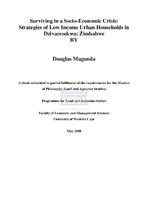| dc.contributor.advisor | Du Toit, Andries | |
| dc.contributor.author | Magunda, Douglas. | |
| dc.contributor.other | | |
| dc.contributor.other | Faculty of Economics and Management Sciences | |
| dc.date.accessioned | 2013-11-26T18:51:41Z | |
| dc.date.available | 2009/12/09 14:31 | |
| dc.date.available | 2009/12/09 | |
| dc.date.available | 2013-11-26T18:51:41Z | |
| dc.date.issued | 2008 | |
| dc.identifier.uri | http://hdl.handle.net/11394/2473 | |
| dc.description | Magister Philosophiae (Land and Agrarian Studies) - MPhil(LAS) | en_US |
| dc.description.abstract | For close to a decade, Zimbabwe has experienced a protracted socio-economic crisis. Although it is affecting both rural and urban areas, major forms of formal safety nets by the Government and Non-Governmental Organisations have been confined to rural areas. On the other hand the virtual collapse of the formal food marketing system in urban areas and the high formal unemployment rates have contributed to increased vulnerability of low income urban households to food insecurity. Using qualitative research methods, the study set out to understand livelihoods of low income urban households in Dzivaresekwa. In particular strategies low income households employ to cope with the negative macro-economic environment prevailing in Zimbabwe. | en_US |
| dc.language.iso | en | en_US |
| dc.publisher | University of the Western Cape | en_US |
| dc.subject | Low income urban households | en_US |
| dc.subject | livelihoods | en_US |
| dc.subject | food security | en_US |
| dc.subject | coping strategies | en_US |
| dc.title | Surviving in a Socio-Economic Crisis: Strategies of Low Income Urban Households in Dzivaresekwa: Zimbabwe | en_US |
| dc.type | Thesis | en_US |
| dc.rights.holder | University of the Western Cape | en_US |
| dc.description.country | South Africa | |

